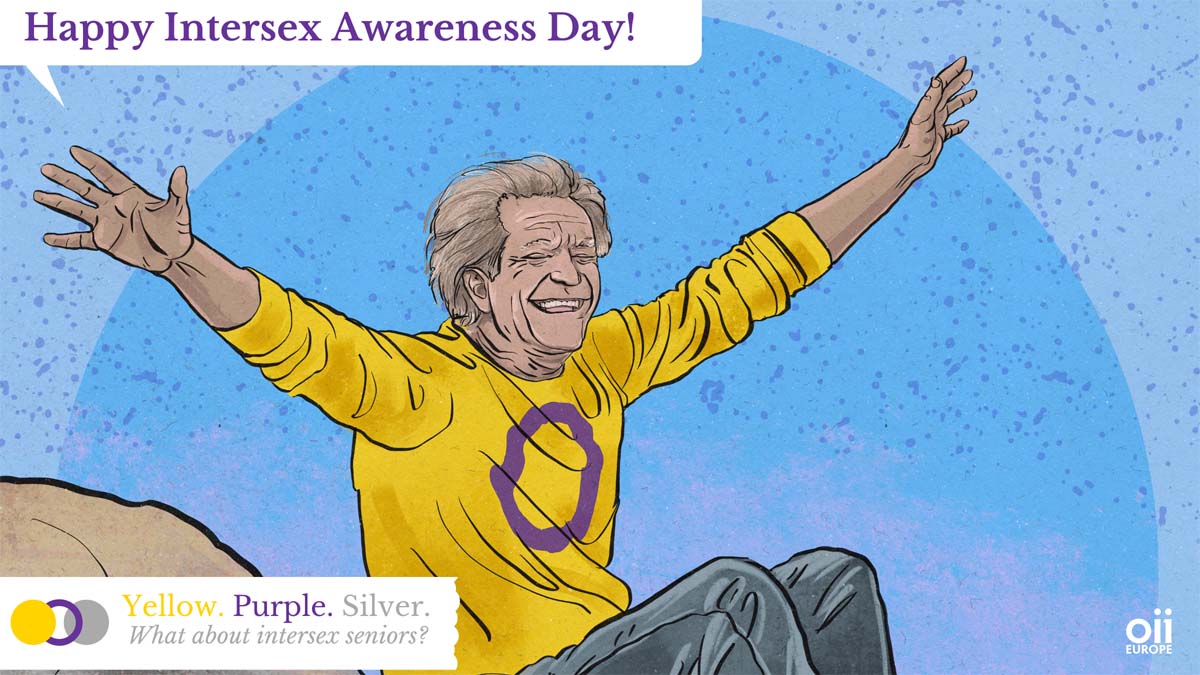Campaign: Yellow.Purple.Silver. What about intersex seniors?

The human rights of elderly people are under pressure in a social context where the demographic is changing towards an ageing population, which translate into a specific form of discrimination against older/or perceived “older” persons. But it exists a further discrimination for people belonging to this age group that are also intersex.
According to Ms. Claudia Mahler, an UN Independent expert on the enjoyment of all human rights by older persons, “Older lesbian, gay, bisexual, transgender and intersex persons are one of the most vulnerable groups, receive insufficient services and end up with poor health outcomes. They are also one of the most invisible groups in old age due to the social stigma and are largely ignored by national laws and policies and by society at large. They may experience multiple forms of discrimination due to the stigma linked to their sexual orientation, gender identity and sex characteristics.”
There is more awareness today on the human rights issues intersex people face. But while this mostly focuses on the diverse impacts that pathologization and harmful medical practices such as IGM have on infants, children, or young adults that were born with variations of sex characteristics, less is known about the situation of a population that has been appearing over the last 70 years. Individuals who were subjected to these harmful practices continued to grow into adults that had to cope with the life-long consequences such interventions had on their body and minds, and often without being informed or lied to by their health care providers. They often face multiple issues and challenges, like: lack of right and access to health and adequate medical follow-up and support in regards of past medical interventions they experienced during their lifetime; experience of discrimination, hate speech, hate crime and violence. Living in a traditionally binary society impacts intersex persons‘ lives on multiple levels: in regards to Legal Gender Recognition and legislation; in regards to Jobs and Employment, and so on.
For those who have not yet found refuge in the growing intersex community, becoming older often means to cope and to live with the ongoing challenges as an intersex person in complete isolation, without a support network, family or kinship, and without adequate language to articulate their experiences in an affirmative way, due to pathologization, stigma, secrecy, misinformation and shame. All that has an impact on the Mental Health of Intersex People, for which it is necessary urgent attention.
This year, on the occasion of the Intersex Awareness Weeks Campaign 2022, the Organisation Intersex International Europe (OII) wants to take into view the situation of elderly intersex persons and raise awareness about their very specific challenges and needs. These apply also to the veterans of the community, the Survivors and Elders and often Pioneers of the intersex human rights movement. The aim of this campaign is to raise awareness about elderly intersex persons, by inviting them to become advocates in the fight for equality and dignity for ageing intersex people.
For the upcoming year the campaign is planning a publication project with testimonials and art by elderly intersex persons.

